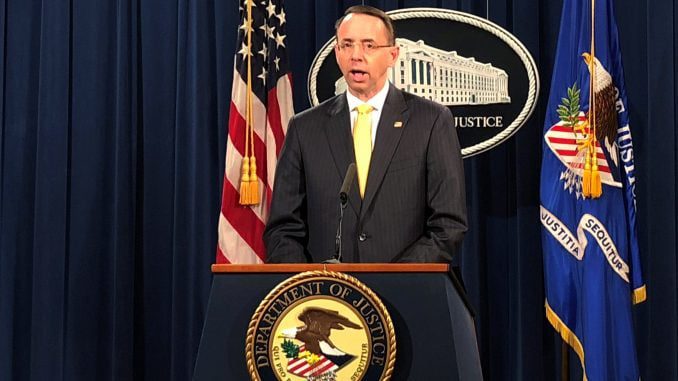
Raleigh – For those who haven’t had a chance to comb through last week’s indictment of a dozen Russians released by the U.S. Department of Justice, the details are still emerging. The accused are alleged to have led a St. Petersburg, Russia-based internet research agency, referred to throughout the indictment as “The Organization,” which was tasked with “impairing, obstructing, and defeating the lawful government functions of the United States by dishonest means in order to enable the Defendants to interfere with the U.S. political and electoral processes, including the 2016 presidential election.”
The indictment alleges that the group used social media to post hundreds of thousands of politically charged messages with the intent of creating confusion and nationwide discord as far back as 2013, under former President Barack Obama. At some points the accused had hundreds of employees divided into departments like graphic design, finance, content management, data analysis and a “translator project.” The employees were allegedly divided into day and night shifts with a list of U.S. holidays so they could post appropriate content.
The indictment cited organization documents in saying they were instructed to create “political intensity through supporting radical groups, users dissatisfied with [the] social and economic situation and oppositional social movements.”
By 2014, the campaign was costing approximately 73 million rubles, or $1,250,000 a month. The money went to things like travel expenses, “drop phones,” hardware and “evacuation scenarios.”
Among the information in the 37-page indictment, the accused includes four women, and the operation started at least as early as 2013 and ran through post-2016 election weeks, with the Russian group organizing rallies in New York and Charlotte called “Trump is not my President.”
The group is accused of wire fraud, identity theft, and a number of other charges. They allegedly stole the social security numbers, home addresses, birthdates and names of American citizens to set up fake PayPal accounts to pay for online advertising and supplies for rallies, fake personal social media accounts for posting comments, and fake issue and party organizations to promote action. Some of the accounts created by “The Organization” included: “United Muslims of America” ,“Secured Borders” , “Heart of Texas”, and “South United.” The indictment said the group’s “@TENN_GOP” Twitter handle, posing as the Tennessee Republican Party, gained 100,000 followers.
According to the indictment, in 2013 several of the accused leaders traveled to New York, Texas, New Mexico, Georgia, Louisiana, Colorado, Illinois, and Nevada to conduct research. Documents showed a Texas-based grassroots organization told them that their focus should be on “purple states like Virginia, Colorado and Florida.”
In one part of the indictment, the content of some of their sites allegedly urged black voters not to vote at all, or to vote for green party candidate Jill Stein. Organization-controlled sites called “Woke Blacks” and “blacktivist” posted items that read “Choose Peace and Vote Jill Stein, trust us its not a wasted vote,” and “We cannot be forced to vote for the lesser of two devils; we surely would be better off not voting at all.”
The Kremlin said on Monday that U.S. charges didn’t prove Russian state involvement. However, one of the indicted, Evgeny Prigozhin, 56, nicknamed ‘Putin’s cook’ because of his catering business has multiple lucrative Russian government contracts that organizes banquets for the Russian leader and other senior political figures. U.S. officials say has extensive ties to the country’s military and political establishment.
“They (the Americans) are talking about Russian citizens, but we have heard in announcements from Washington accusations about the involvement of the Russian state, the Kremlin and the Russian government,” Russian spokesman Dmitry Peskov told reporters on a conference call.
The actions detailed in the indictment describe work to disparage Republicans Ted Cruz and Marco Rubio and Democrat Hillary Clinton; and promote Democrat Bernie Sanders and Republican Donald Trump. They also organized rallies before the election opposing Clinton and after the election opposing Trump. Facebook’s Vice President of Ads, Rob Goldman confirmed this week that the Organization’s Facebook ads mostly ran after the election, demonstrating that the goal was to create conflict.
“I have seen all of the Russian ads and I can say very definitively that swaying the election was *NOT* the main goal. The majority of the Russian ad spend happened AFTER the election,” said Goldman on Twitter. “We’ve shared that fact but very few outlets have covered it because it does not align with the main media narrative on Trump and the election.” He continued in another Tweet.
Nowhere in the indictment does it indicate a knowing collusion with any campaign, but it does say some Americans “unwittingly” communicated with the Organization. Consequently, the election-meddling allegations have soured U.S.-Russia ties further, triggering new sanctions as well as pressure for more restrictions. Friday’s indictment and news that Mueller’s investigation is not yet finished mean the issue is likely to dog the troubled relationship for a long time.



